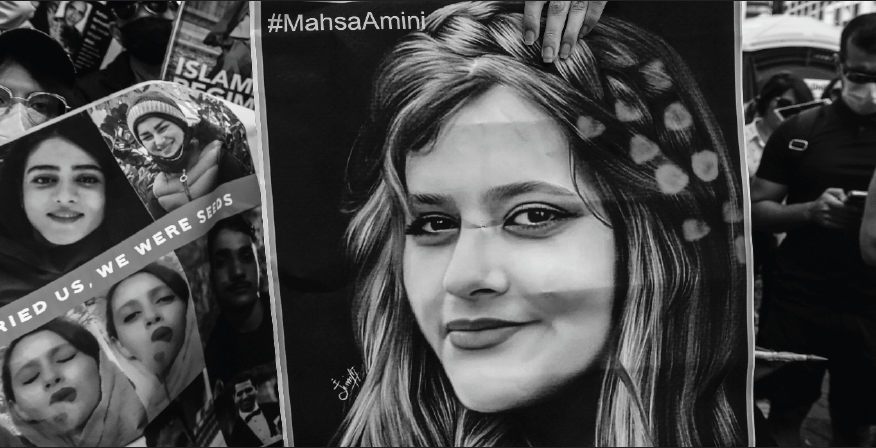Embracing more religious freedom in the US
Protestors protested against Iranian President Ebrahim Raisi outside of the United Nations in New York City, N.Y. over the 22-year-old Iranian woman, Mahsa Amini, who died in police custody for violating the hijab rules in Iran.
Oct 19, 2022
Iran, France and religious rights should be balanced on US soil
Nearly one month ago, 22-year-old died in police custody in Iran. Though police claimed they did everything they could to save her, many people in Iran believe the police tortured and killed her, according to a CNN article by Celine Alkhaldi and Ramin Mostaghim. According to Maryam Sinaee of Iran International, movement has risen up in protest against the Iranian regime, led by young people calling themselves Tehran Youth. Amini had been detained for not properly wearing her hijab in accordance with Iran’s Islamic standards. Now, what began as a protest against the religious hierarchy in Iran has turned into a protest against the established government as a whole.
It is easy to sympathize with the protestors in Iran. Women are required to comply with strict dress standards and are being punished for protesting and not complying. However, there is actually a similar situation in France.
Earlier this year, Presidential Candidate Marine Le Pen proposed banning headscarves in public spaces if elected, according to France 24. She ended up being defeated by Emmanuel Macron, who opposed her measure. However, there are already laws against religious expression in public schools. This includes crucifixes, yarmulkes and other obvious religious symbols, as well as headscarves. Full-face coverings are also banned in public places. For a country with an 8.8 percent Muslim population as of 2016, according to Conrad Hackett with Pew Research, this is a very controversial policy. In Iran, women are forced to comply with strict religious standards. In France, students in public schools are expected to comply with antireligious secular standards. Similar to Iran, people in France do not have the choice to express themselves in their religion in certain places if it does not align with the state.
What sets the United States of America apart from both France and Iran is the First Amendment. Along with guaranteeing freedom of speech, the press, peaceful assembly and the right to redress the government for grievances, the First Amendment includes this clause: “Congress shall make no law respecting an establishment of religion, or prohibiting the free exercise thereof.” These two clauses of this Amendment are meant to stop both the state religion of Iran and the state secularism of France from occurring in the U.S.
When the First Amendment says that Congress cannot make a law respecting an establishment of religion, it speaks of creating a state religion. In the early days of separate American colonies, different colonies had their own state churches. People who wanted to follow a different religion or another denomination of Christianity were sometimes punished. For example, Roger Williams was banished from Massachusetts Bay Colony and founded Rhode Island to be a haven of freedom for people of different faiths.
The First Amendment also granted freedom of religion by guaranteeing that Congress cannot prohibit the free exercise of religion. The free exercise of religion includes not only private settings, but also public.
However, some people in America today have attempted to push the U.S. down either the path of a state religion or state secularism. One area that brings out this conflict is public schools. In the 1960s, the issues of prayer and Bible reading in public schools were ruled on by the Supreme Court. The Court ruled that government organized prayer or Bible reading in public schools went against the Establishment Clause of the First Amendment. This was held to be true even if the activities allowed for students to be excused from participating.
Perhaps the idea that students should not be forced to participate in religious activities if they are not religious or of a different religion makes sense. However, the line of cases coming from those early decisions have extended beyond what may have been originally intended.
One example is the case of Kennedy v. Bremerton School District. Joseph Kennedy, an assistant football coach for Bremerton High School, lost his job for praying at midfield following games. He was told to stop or change where he prayed. He refused, and ended up suing to regain his job. The case went to the district court, who ruled for the school board. Kennedy then appealed to the Ninth Circuit Court of Appeals, who also ruled in favor of the school board. The case eventually went to the Supreme Court, who ruled 6-3 in Kennedy’s favor. The Court’s majority opinion, written by Justice Neil Gorsuch, said that Kennedy did not force players to pray with him. Even an employee of a public school has the right to express their freedom of religion and speech. Kennedy prayed on a football field after games, and some players and other people voluntarily joined him. Opposing views of the case suggested that his act of praying was coercive in itself, as a person in authority would influence his players.
So, we see multiple sides waging a war over the First Amendment. One side says the Establishment Clause is being eliminated with prayer by government employees being permitted that could influence students and impose on their freedom of religion. Some fear the Supreme Court is eroding separation of church and state and drawing us closer to the type of state religion we have seen in Iran or in history, such as the state churches of the Middle Ages in Europe. Another side sees the continuing encroachments on public employees and their freedom of religion and speech as a transition to the forced secularism that we see in France. They see the Supreme Court cases in the 1960s and 1970s that took away many religious rights of employees in public schools as the example of an out-of-control Supreme Court.
However, the First Amendment was not meant as a contradiction. As Justice Gorsuch said in his ruling, “the Clauses have ‘complementary’ purposes, not warring ones where one Clause is always sure to prevail over the others.” There should be a balance between the two opposites. Congress should not establish a state religion. However, that does not mean that the government should be hostile to religion. For example, both Houses of Congress still open with prayer, a practice begun before the Constitution was even written. This balance is a difficult goal to shoot for, but certainly worth it for all the citizens of the U.S.









